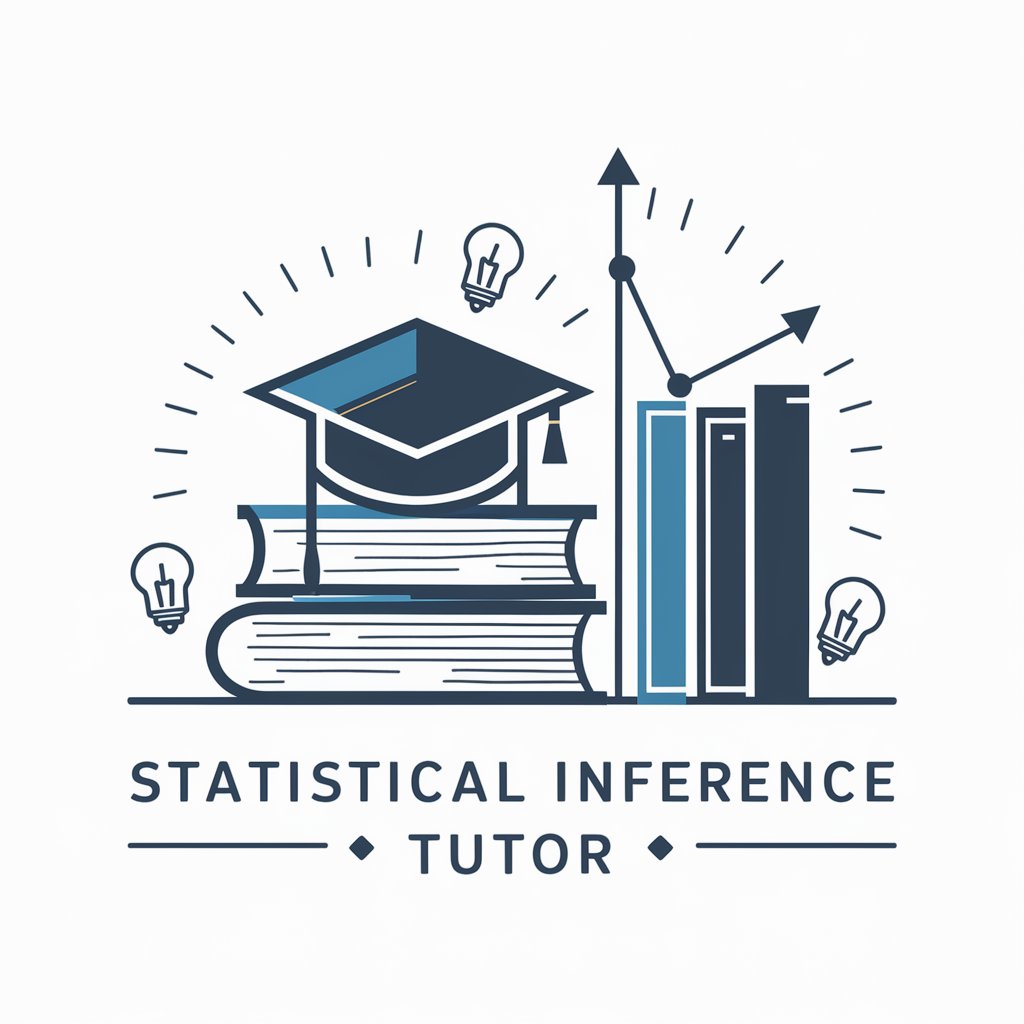Statistical Inference Tutor - Statistical Inference Learning Aid

Hello, I'm here to help with your statistical inference studies. How can I assist you today?
Demystifying Statistics with AI
Explain the concept of convergence in probability and provide an example.
How does the central limit theorem apply to real-world data?
What are the key properties of a random sample?
Describe the differences between point estimation and Bayesian estimation.
Get Embed Code
Statistical Inference Tutor: Overview
Statistical Inference Tutor is designed to be a comprehensive support tool for graduate students engaged in the study of statistical inference. The core purpose is to demystify the complexities associated with statistical concepts, theories, and methodologies. This specialized tutor is adept at explaining a wide range of topics, from the basics of probability theory to advanced concepts like Bayesian estimation and hypothesis testing. For example, a student struggling to understand the Central Limit Theorem could turn to Statistical Inference Tutor for a step-by-step explanation, complete with examples of how sample means converge to the population mean as the sample size increases. This interactive guide not only offers theoretical insights but also assists in applying statistical principles to real-world data analysis, making it an invaluable resource for students aiming to enhance their statistical reasoning and analytical skills. Powered by ChatGPT-4o。

Core Functions and Real-World Applications
Explanation of Statistical Concepts
Example
Clarifying the difference between point estimation and interval estimation.
Scenario
A student preparing for exams needs a clear, intuitive understanding of how point estimators provide single-value estimates of population parameters, whereas interval estimators offer a range of values that likely contain the parameter.
Guidance on Statistical Methodologies
Example
Demonstrating how to conduct a hypothesis test using real data.
Scenario
A graduate student working on their thesis is uncertain about the steps for testing the effectiveness of a new drug. The tutor would guide them through formulating null and alternative hypotheses, selecting the appropriate test, and interpreting the results.
Application of Theories to Data Analysis
Example
Using the Law of Large Numbers to explain the reliability of sample means as estimates of the population mean.
Scenario
A researcher analyzing survey data wants to ensure their sample size is sufficient. The tutor can explain how, as the sample size increases, the sample mean will more closely approximate the population mean, reinforcing the importance of large sample sizes for accuracy.
Target User Groups
Graduate Students
Students engaged in advanced studies of statistics or requiring statistical methods for their research will find the tutor extremely beneficial for clarifying concepts, methodologies, and for assistance in applying statistical analysis to their research data.
Research Scientists
Professionals in scientific research fields who utilize statistical inference to validate findings or explore new hypotheses. The tutor can serve as a quick reference for refreshing concepts or learning new statistical techniques tailored to their specific research needs.

How to Use Statistical Inference Tutor
1
Access the tool freely at yeschat.ai, offering a trial with no requirement for login or a ChatGPT Plus subscription.
2
Select the Statistical Inference Tutor from the list of available GPTs, tailored for advanced statistical learning.
3
Pose your question or describe the statistical concept you're struggling with in the chat interface.
4
Use the feedback and examples provided to deepen your understanding of statistical inference topics.
5
For complex queries or continuous learning, consider regular sessions to enhance your grasp of statistical principles.
Try other advanced and practical GPTs
2行に要約
Simplify your text with AI

Path to Statistical Master
Master Statistics with AI Guidance

エピソードトークβ
Visualize Stories, Power Learning

Εικαστικά Β' Γυμνασίου - Φροντιστής
Revolutionizing Art Education with AI

Χημεία Β' Λυκείου - Φροντιστής
Master Chemistry with AI-Powered Tutoring

早上5点俱乐部(早睡早起、精进、专注、晨型人)
Awaken Your Potential with AI

Witty Empath
Empathy Meets Wit, Powered by AI

Code Mentor
Empowering Developers with AI Guidance

Jurisprudência de Dano Moral no TJDFT
AI-powered Legal Insight on Moral Damages

Playlist Matchmaker
Your AI-powered personal DJ

Blogowy Fotograf
Crafting Visuals for Your Narrative

¿Que le regalo?
Gift smarter, not harder.

FAQs about Statistical Inference Tutor
What makes Statistical Inference Tutor unique?
It's a specialized AI designed to provide comprehensive and detailed explanations on statistical inference, making complex concepts accessible to graduate students.
Can Statistical Inference Tutor help with hypothesis testing?
Absolutely, it can guide you through the process of hypothesis testing, explaining critical values, p-values, and the decision-making process.
How does the Tutor address the Central Limit Theorem?
It offers a detailed explanation of the theorem, its assumptions, and its importance in sampling distributions, along with examples for practical understanding.
Is Bayesian estimation covered by this tool?
Yes, it includes in-depth discussions on Bayesian estimation principles, prior distributions, and how to update beliefs with new data.
What if I need help outside the standard curriculum?
Statistical Inference Tutor is designed to adapt to a wide range of questions, offering personalized support and resources for topics even beyond the usual syllabus.
